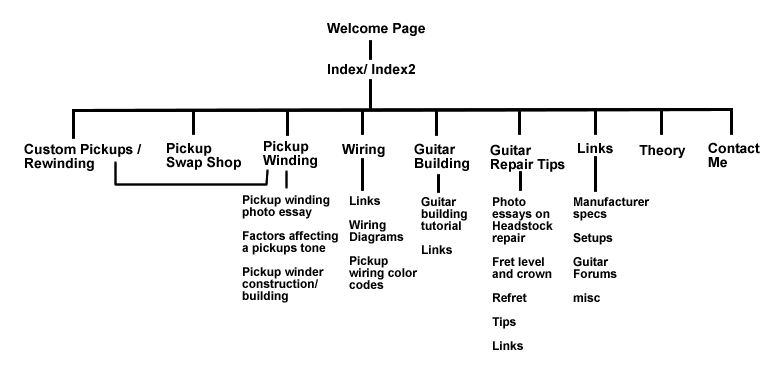My Pickup Winder
Pickups
I currently offer
A quick photo overview
on winding a pickup
Factors affecting
the way a pickup sounds
Vintage Pickup
specifications for Fender, Gibson, etc.
My newest winder
made from a wood lathe
This page shows how
I adapted a small drill press for winding pickups. This first
photo shows the entire setup.

The setup consists
of a winder faceplate which is made from 1/2" hardboard
with a recessed carriage bolt for a shaft. A tensioner and
guide assembly made from scrap corian countertop, and a small
coffee can which holds the spool of wire. When making the
faceplate the most important thing is that it spins true,
very little wobble is acceptable as it will cause the pickup
bobbin to snag the wire when winding. The coffee can must
not have any rough edges along the opening which could snag
and break the wire, or ruin the wires insulation.(I'm not
using the can at all anymore)...Here's a closeup of the tensioner/guide
assembly.

The corian was obtained
from a kitchen remodeling shop for free. It's the scrap from
cutting in a sink. Superglue bonds this and makes it like
it's one piece. I drilled a hole in the front edge of the
table for mounting the assembly by means of a machine screw
and standard "T nut" in the corian (bend the prongs
till they pop off, and hammer edges flat, the prongs will
NOT go into the corian) The "T nuts" are held in
place with 5 minute epoxy. The tensioner is made with another
Machine screw and "T nut" assemby clamping down
on two felt "washers". In both cases the head of
the machine screw was cut off and a control knob with set
screw was installed. Slightly above the shelf on which the
tensioner is mounted is a small hole through the upright (hard
to see) it is the "guide" function of the assembly.
In use, the wire is routed between the felt washers through
the guide hole and onto the bobbin. The drill's table is set
for the upper limit of winding travel, and the drills depth
stop is set for the lower limit. The wire IS routed in this
photo, it's about the thickness of a hair! The whole guide
assembly can be omitted if you wanted to guide by hand, pinching
the wire between felt.
As you can see there
isn't really a lot required to do wind pickups. The cost of
the wire is significant as the suppliers have minimum orders,
so you will end up with WAY MORE wire than needed for a few
pickups. Alnico magnets are hard to come by in small quantities,
bobbins are availiable from Allparts. The easiest way to get
started is by rewinding cheap and dead pickups, and then buying
the parts for humbuckers from Allparts(they do sell the alnico
magnets for them). The hard part is knowing what the results
will be. Fortunately for me, I have gotten help from some
very respected pickup makers. There seems to be a certain
amount of voodoo in making hand wound pickups, and there are
alot of factors which play into it. To get an idea of what
I've learned about these factors go
here.
Here's a picture of
a couple pickups I made using this winder.

For a quick photo
overview on making an S-90 pickup click here




